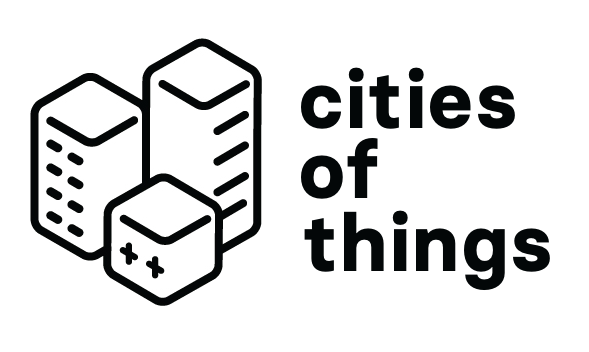To support the story of Cities of Things, making clear what is different from a smart or intelligent city, this is the manifesto of Cities of Things.
The manifesto is not (at the start) a fully constructed story or academic paper. It addresses the important aspects that emerged from doing projects in the last years.
To make them clear a short description is added ad every statement. This manifesto is meant as starting point for discussion and is a work in progress.
🧩Intelligence is defined by the assemblage of objects
The core belief of Cities of Things is the impact of connected objects and machine intelligence, IoT, and AI. Not of a single object but in the ecosystems that form the context of the cities we live in. Just like the differentiating power of a city is in the creative connections between the people living, the opportunities of serendipity, the same resourcefulness is happening when humans and things are connected in the city.
🧱Cities of Things are describing the interactions with things and systems of things
The connections are key to the creative intelligence that emerges and feeds back into that ecosystem. A city of things does not exist of separate nodes but of systems of nodes. The cities of things are capturing the interactions and the emerging and existing systems. The Cities of Things aim to offer the right tools for capturing these infrastructures and create actionable tools for understanding and designing these cities.
🤝Relations are the shaping elements for the new infrastructure; relations over nodes
To make sense of the objects, of the things and the humans, we need sensing elements. Data is flowing from the nodes into images of the systems, of the activities happening, the responses, the interactions. The Cities of Things infrastructure is not shaped by the nodes or a collection of nodes, it is shaped by activities that shape interactions and above all, the relations that describe the comprehensive character of the infrastructure and the ecosystem.
The relations are also characterizing the actors in the network. Raw and static data will be there, but is not key to understanding and leveraging the Cities of Things. This means we need new challenges in the description of cities. Capturing relations and designing for the relations in a good way is what cities of things aim for. Think about how DAOs are built.
🤖Respect the non-human contributions, design for humans
Things as citizens. It is a provocative statement but a needed approach to leverage the relations as a building element for the cities of things. The actor-network theory is an inspiration but we use the definition of things instead of objects to understand the role of nonhuman actors. Things are meaning and context. Things have a form of agency.
At the same time, we do not deny the perspective of humans. We are not creating systems of self-organizing things that are more important than humans. We respect things as active partners in the city context and value the unique characteristics.
🫂Share goals with non-humans, co-perform in reaching the goals
Objects, things, products, independent from the framing it is key to move away from the appreciation of things as tools, as objects for the benefit of the human partners. Real partners mean a shared goal, to generate the most outcome. The co-performance inspires Cities of Things to design for an inclusive design where things are stakeholders too.
🔮Predictive knowledge is part of the interplay of human and non-human collaborators
Data that flows in the city ecosystems of humans and non-humans are describing the relations. Not only as a mirror on the reality; the interaction is not only an interplay in the now but also with both knowledge from the past as knowledge from the future. Predictive knowledge generated by comparing similar situations that have been played out in other places in other contexts will be integrated in the interplay of humans and nonhumans to shape the context for the interplay or even the ingredients of the services at hand.
😇Empower the citizens, commit to societal impact
Cities of Things aims to contribute to better more liveable cities, sustainable, inclusive, vibrant. Nothing less.
